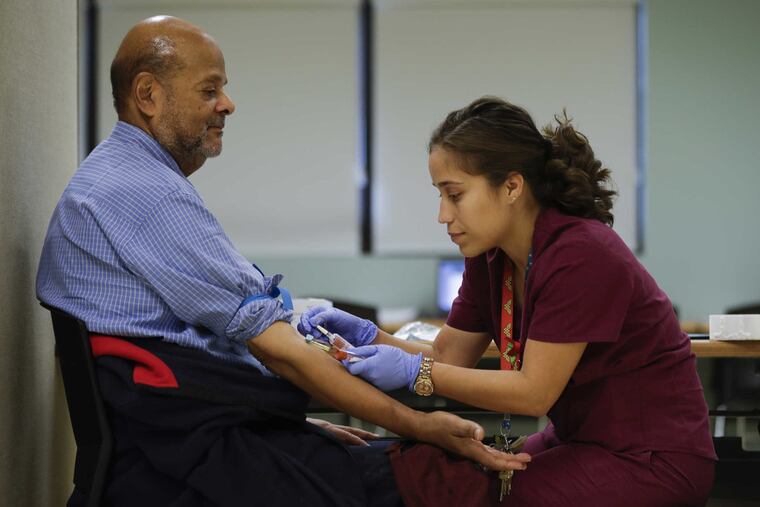National PFAS health study will include Bucks, Montgomery, Gloucester County residents
Residents worried about the health impacts of PFAS water contamination will have a chance to receive medical testing. “We will finally have some health data that we can build upon,” one resident said.

Philadelphia-area residents who were exposed to drinking water tainted by PFAS will receive in-depth medical testing as part of a national study examining the impact that the chemicals can have on human health, the federal government announced Monday.
Two of the seven sites across the country awarded grant funding for health studies are in the Philadelphia region; Bucks and Montgomery County residents whose drinking water was tainted by firefighting foams used at military bases will participate, as will residents of Gloucester County, where PFAS used at manufacturing sites seeped into water supplies.
Each site will receive an initial $1 million federal grant to participate in the study. The Pennsylvania Department of Health, which will conduct the Pennsylvania study along with Research Triangle Institute International and Temple University, expects the study to continue for five years, with a total of $5 million in grant funding for each site. Rutgers Biomedical and Health Sciences received the grant for Gloucester County.
Residents affected by the water contamination greeted the announcement with enthusiasm; many of them have pushed for state or federal funding for an in-depth health study.
“We will finally have some health data that we can build upon,” said Hope Grosse, who grew up across the street from the former naval base in Warminster.
A 2018 blood sampling pilot program for Bucks and Montgomery County residents found that those tested had above-average levels of PFAS in their bloodstreams. The study announced Monday will involve more in-depth analysis and monitoring, according to Pennsylvania officials. Participants will receive blood sampling, medical testing, and a review of their medical records.
» READ MORE: The Inquirer's previous PFAS coverage
“This grant will expand our ongoing research efforts to determine the extent of residents’ exposure to PFAS in Bucks and Montgomery Counties while contributing to a larger, national study to look at the health impacts of these chemicals,” Pennsylvania Secretary of Health Rachel Levine said in a news release announcing the grant.
It was not immediately clear Monday how residents will be selected to participate, how many will be included, or when testing will begin. The smaller study in Pennsylvania last year included 235 randomly selected Horsham, Warminster, and Warrington residents.
Nationwide, the study will include at least 6,000 adults and 2,000 children across all seven sites, according to a news release from the Centers for Disease Control and Prevention and the Agency for Toxic Substances and Disease Registry, which awarded the grants.
Researchers will examine immune response, lipid metabolism, kidney function, and glycemic parameters, and evidence of thyroid disease, liver disease, and diabetes, according to the federal agencies. The study will not, however, examine a relationship between PFAS exposure and cancer.
Researchers have linked PFAS to some cancers, but the federal agencies said a study many times larger than the one announced Monday would be necessary to look at cancer outcomes. Officials are exploring other options for evaluating the connections between PFAS and cancer using previously collected data, the agency said.
» READ MORE: Chemicals that tainted water on military bases spreading to other towns in Bucks, Montco
As Pennsylvania completed the blood sampling pilot study last year, some residents were critical of the random selection of participants and asked for further testing and more detailed biomonitoring. Grosse said she is optimistic that the new study will involve wider outreach and recruitment of participants.
“We are hoping for full support from the community as this will bring awareness and [I] hope that we can find some answers to some of these health issues,” she said in an email Monday.
PFAS, or per- and polyfluoroalkyl substances, are found in everyday items such as cardboard packaging, nonstick pans, and carpets. The chemicals seeped into public drinking water sources across the country after they were used for decades at military bases and manufacturing sites.
The new study will be the first to examine exposure to multiple types of PFAS across the country. Federal officials said it could help communities that are not participating in the study respond to PFAS water contamination.
Sites in Colorado, Michigan, New York, and California where residents were exposed to PFAS-tainted drinking water also received grants as part of the study.
“I’m pleased that the CDC has decided to invest in studying the impact of PFAS on health in communities across the country, including in southeastern Pennsylvania,” Sen. Bob Casey (D., Pa.) said in a statement Monday. “While there is still more work to do, this is a positive step as we work to ensure all Pennsylvanians have clean drinking water.”